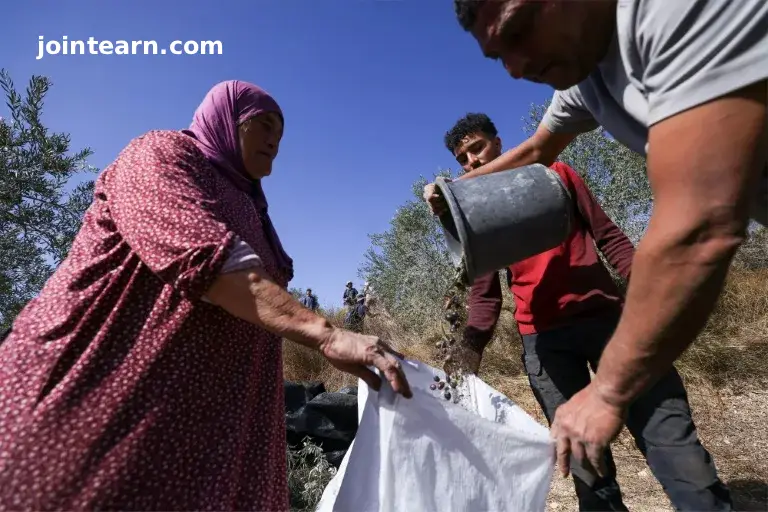
RAMALLAH, October 25, 2025 — The annual olive harvest season in the Israeli-occupied West Bank, a time once marked by unity and tradition, has turned violent this year as a wave of settler attacks and vandalism has spread across Palestinian villages. The latest incidents have left injuries, destruction, and deep scars on communities already facing growing restrictions on their land.
Shocking Scenes of Violence in Turmus Ayya
A harrowing video from Turmus Ayya, near Ramallah, captured worldwide attention when a masked Israeli settler was filmed beating an elderly Palestinian woman, 55-year-old Um Saleh Abu Aliya, as she picked olives. The footage, recorded by an American journalist, shows the woman collapsing to the ground after being struck.
Witnesses say around 100 settlers stormed the area, attacking harvesters and foreign volunteers. “Everybody was fleeing because the settlers attacked suddenly,” said Yasser Alkam, a city official. “One Swedish activist had his arm and leg broken.”
Farmers said Israeli soldiers later arrived and fired tear gas to disperse the crowd — but only after settlers burned vehicles and vandalized property. The Israeli police have since pledged to identify the attacker, but Palestinians say such promises rarely lead to justice.
Expanding Settlements and Increasing Violence
The 2025 olive harvest has been one of the most violent in decades. According to AFP journalists on the ground, at least six separate attacks have been recorded this season, with farmers denied access to their fields or finding their trees uprooted and crops destroyed.
These confrontations come amid rapid settlement expansion. More than 500,000 Israeli settlers now live in the West Bank, which Israel has occupied since 1967 — in defiance of international law, which deems all settlements illegal.
“Fighting back would only bring more violence, sometimes with the army’s backing,” said Nael al-Qouq, a local farmer. “We are just trying to harvest what our fathers planted.”
Farmers Losing Generations of Work
In Al-Mughayyir, a neighboring village, Abdul Latif Abu Aliya, 55, stood on what remains of his family’s land — now a field of rubble.
“I owned ten dunams of olive trees,” he told reporters. “They uprooted everything except the few trees in my home garden.”
Israeli bulldozers razed the field after a settler was reportedly injured nearby. An army order claimed “security reasons,” but the farmer’s family believes it was retaliation. “Those trees were planted by my grandfather,” Abu Aliya said. “Now they are gone.”
Mounds of dirt and broken roots now form a barrier just 100 meters from the family home, an area the family fears to cross because of settler patrols and attacks.
A Season of Fear and Loss
Palestinian officials say the 2025 olive harvest has been the worst in 60 years, citing not only settler violence but also climate damage and drought.
“This is the most difficult season we have seen,” said Agriculture Minister Rizq Salimia, urging the international community to protect Palestinian farmers.
The United Nations Human Rights Office also condemned the “severe and systematic attacks” on civilians, calling out “dangerous levels of impunity” for settlers involved.
The UN’s humanitarian agency (OCHA) reported that 27 villages were affected by harvest-related assaults between October 7 and 13 alone — including theft of olives, destruction of trees, and physical violence.
Olives: A Symbol of Palestinian Identity
For many Palestinians, olive trees represent more than a livelihood — they are a symbol of national identity and resistance.
The West Bank hosts over 8 million olive trees for a population of about 3 million people, according to the Palestinian Agriculture Ministry. Each October, families gather to harvest olives, often joined by activists and volunteers from abroad.
But what was once a cultural celebration of endurance and community has become a season of fear, destruction, and displacement.
“Olives are our roots,” said one farmer. “When they attack our trees, they attack our history.”
A Call for International Protection
As violence escalates across rural areas, rights groups warn that settler attacks are becoming more organized and emboldened, often occurring under the watch — or protection — of Israeli forces.
Human rights monitors urge stronger international oversight and accountability mechanisms to protect Palestinian civilians and ensure that perpetrators face justice.
“The olive harvest should be a season of peace and productivity,” said Ajith Sunghay, head of the UN Human Rights Office in the Palestinian territories. “Instead, it has become a symbol of unchecked violence and impunity.”


Leave a Reply